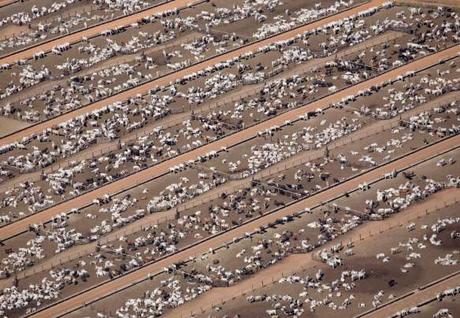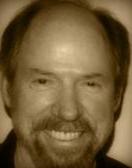GR: In this study, the investigators analyzed global biomass, a common measure of animal and plant abundance, to estimate changes in the abundance of organisms. They found that humans and livestock account for 96% of all animals on Earth. Previous global estimates have used numbers, not biomass, to estimate abundance. The results agree, but the new study was able to extend estimates farther back in history. Both approaches conclude that more than half of all animals have been lost since 1970. The investigators in the new study found that since human civilization arose, 83% of wild mammals have disappeared.
The Guardian added excellent graphics to illustrate the research findings. Highly recommended!

A cattle feedlot in Mato Grosso, Brazil. 60% of all mammals on Earth are livestock. Photograph: Daniel Beltra, Greenpeace
“Humankind is revealed as simultaneously insignificant and utterly dominant in the grand scheme of life on Earth by a groundbreaking new assessment of all life on the planet.
“The world’s 7.6 billion people represent just 0.01% of all living things, according to the study. Yet since the dawn of civilisation, humanity has caused the loss of 83% of all wild mammals and half of plants, while livestock kept by humans abounds.
“The new work is the first comprehensive estimate of the weight of every class of living creature and overturns some long-held assumptions. Bacteria are indeed a major life form – 13% of everything – but plants overshadow everything, representing 82% of all living matter. All other creatures, from insects to fungi, to fish and animals, make up just 5% of the world’s biomass.
“Another surprise is that the teeming life revealed in the oceans by the recent BBC television series Blue Planet II turns out to represent just 1% of all biomass. The vast majority of life is land-based and a large chunk – an eighth – is bacteria buried deep below the surface.
“I was shocked to find there wasn’t already a comprehensive, holistic estimate of all the different components of biomass,” said Prof Ron Milo, at the Weizmann Institute of Science in Israel, who led the work, published in the Proceedings of the National Academy of Sciences.
“I would hope this gives people a perspective on the very dominant role that humanity now plays on Earth,” he said, adding that he now chooses to eat less meat due to the huge environmental impact of livestock” –Damian Carrington, The Guardian.
Source: The Guardian.

